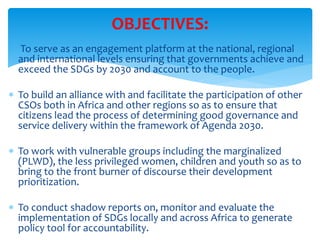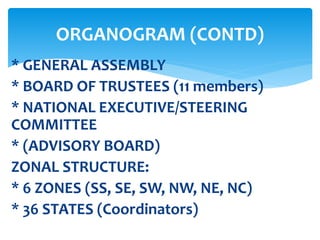Profile of CSCSD
- 1. BACKGROUND AND OVERVIEW OF CSCSD: STRUCTURES AND STRATEGY BY TOLA WINJOBI NATIONAL COORDINATOR CIVIL SOCIETY COALITION ON SUSTAINABLE DEVELOPMENT
- 2. Civil Society Coalition on Sustainable Development (CSCSD) formerly known as Campaign2015+ International is a coalition of over 200 registered civil society and nongovernmental organizations committed to citizens’ empowerment, human rights protection, development and peace in Nigeria. It is the only registered national coalition of organizations purposely created to be working on the monitoring of the 17 Sustainable Development Goals across the six geopolitical zones of Nigeria. Civil Society Coalition on Sustainable Development
- 3. CSCSD collaborates with other like-minded CSOs around the world to promote public debates and discussions on economic and social issues including human rights. A priority in the agenda of CSCSD, among other actions, is campaigning for pro-poor global and national policies that can accelerate broad-based economic growth, poverty reduction and public accountability, as well as the call for immediate action to reduce the debt burden of poor countries and institute fair trade policies and practices, and ODA development effectiveness among the OECD and other developed countries around the globe. INSTITUTIONAL PURPOSE:
- 4. VISION: A society whose centre-stage is justice, peace, fulfillment of human rights and development in all ramifications. MISSION: CSCSD, in partnership with other civil society, the poor and the marginalized, the donors, the development partners, and international community, aims at pressuring governments and other stakeholders to account to SDGs and give the lives of people a meaning through upholding justice, human rights and development. VISION AND MISSION
- 5. Our campaign theme focuses on the following issues: Fulfillment of all economic, social and human rights, Aid and financing for development effectiveness, Global and national security, Development issues, Public accountability, Debt cancellation, Just governance, Gender equality, Trade justice. CAMPAIGN THEME
- 6. To serve as an engagement platform at the national, regional and international levels ensuring that governments achieve and exceed the SDGs by 2030 and account to the people. To build an alliance with and facilitate the participation of other CSOs both in Africa and other regions so as to ensure that citizens lead the process of determining good governance and service delivery within the framework of Agenda 2030. To work with vulnerable groups including the marginalized (PLWD), the less privileged women, children and youth so as to bring to the front burner of discourse their development prioritization. To conduct shadow reports on, monitor and evaluate the implementation of SDGs locally and across Africa to generate policy tool for accountability. OBJECTIVES:
- 7. CIVICUS World Alliance for Citizens’ Participatn. Together 2030 TAP Network Sustainable Development Solution Network Action for Sustainable Development Africa Working Group (AWG) Civil Society Partnership for Development Effectiveness (CPDE) INTERNATIONAL NETWORK PARTNERS
- 8. Democratic governance: CSCSD believes in the principles and practices of democratic governance which necessarily promotes dividends for the people. Transparency and accountability: CSCSD promotes transparency and accountability in its operations and therefore challenges government to be transparent and accountable to the people in all their dealings especially in response to poverty eradication and injustice. Solidarity with the poor: CSCSD has passion for the poorest of the poor and the marginalized, identifies with them, and campaigns with them challenging governments to give their lives a meaning. Inclusiveness: CSCSD believes that the society comprises various groups and stakeholders. “Ensuring that no one is left behind”, there is the need to involve all groups in its operations including the poor, the marginalized, persons with disabilities, people living with HIV/AIDS, women, youths, children, minority groups and other vulnerable groups. CSCSD CORE VALUES
- 9. Partnership: CSCSD considers all the stakeholders including the poor, the marginalized, the minority, and development agencies as co-partners who have an important but collective role to play on the attainment of the SDGs agenda, and upholding of human rights, justice and peace. Equality: Since CSCSD believes in equity and equality, it enjoins the stakeholders to consider gender equality, social inclusion, and just global governance as essential for achieving transformation. Environmental Sustainability: CSCSD values conducive environment and thus strongly believes that all development must happen within planetary boundaries, while corporations must be held responsible for the environmental destruction they cause. CORE VALUES (contd)
- 10. Strategies include: Campaigning/Mobilization Research, Documentation and Information Dissemination South-south and Triangular Cooperation Legislative/Social Policy Intervention Capacity Building Monitoring and Evaluation INTERVENTION STRATEGIES:
- 11. Engagement with other stakeholders (private sector, donors, governments) Complementary role to government’s projects implementation and service delivery. Public policy influencing/lobbying: constitutional & electoral reform, health (C&MH, HIV/AIDS), agric, education, child’s rights, gender equality etc. Citizens’ empowerment and direct capacity building (voice-giving, information, training, livelihoods). Ombudsmanship (advocacy) and whistle blowing role in collaboration with anti-corruption agencies like EFCC & ICPC. SPECIFIC CSCSD ROLE
- 12. Holding stakeholders accountable to SDGs (pushing for horizontal accountability) Conducting action research and policy-informed research into SDGs implementation. Conducting periodic assessment and shadow reports to ensure we are on track to achieving the SDGs. Strive to establish Community Based Budget monitoring mechanisms at the local level. Campaigning and mobilization on critical SDGs and for enabling environment (anti-NGO bill), policies through coalition/networking e.g. CPDE/AWG/Together 2030/TAPN). CSCSD ROLE
- 13. Since the adoption by the United Nations on September 27, 2015 of the 17 SDGs, CSCSD has sought partnership with relevant government agencies both at the federal and state levels and with international development partners working in the country. In addition to free distribution of copies of its over 260-page book “A compendium of Deliberations on Post-2015 Development Agenda”, advocacy visits are being paid to the governments: Office of the Senior Special Assistant to the President on SDGs (OSSAP SDGS); the House of Representative Committee on the SDGs; and the Ministry of Budget and National Planning. At the level of Development Partners we have submitted letters of introduction and collaboration to UNDP, USAID, DFID, PACT Nigeria, Oxfam, PLAN, World Bank to mention but a few. Our biggest achievement so far is the successful registration of the group by the Corporate Affairs Commission as Civil Society on Sustainable Development Goals. By this we are better positioned with legal backing to fully engage our government on SDGs implementation, monitoring and accountability in Nigeria. ACHIEVEMENTS
- 14. Below is a summary of our activities/achievments: Board of Trustees (BoT) meetings of CSCSD organized in Abuja, Lagos, Kano, and Ijebu-Ode. State level meetings of CSCSD members in three geo-political zones – North central, southwest and southsouth State level trainings (Oyo, Ogun and Bayelsa) updating members’ knowledge on SDGs A day’s capacity strengthening workshop on strategies for localizing the SDGs implementation in southwest states, Ibadan March 2017 2 days’ capacity strengthening workshop on strategies for localizing the SDGs for CSOs in Ogun State (April 2017) Establishment of Think Tank Group (Oyo) to be responsible for writing and issuing out position papers, media briefs, press releases, communiqués etc ACTIVITIES
- 15. * Media Capacity building on commitment to professional reportage on SDGs in Ibadan Oyo State June 2017. This was done in collaboration with our strategic partner SDSN. University of Ibadan-based Diamond FM works with our partner, Sustainable Development Solution Network (SDSN), where opportunity is granted to speak on diverse issues of development from time to time. SDSN is based within Centre for Sustainable Development (CESDEV) University of Ibadan. “Ojumo Alayo” 18-week episode SDGs talk-show on AIT every week Splash FM 105.5 Ibadan “SDG Talk” every first Tuesday of the month featured in English. 17-week slot is given free from January and willing to extend it. “Otun Ojo”/New Dawn OGTV Abeokuta. It is a live magazine programme where CSCSD Ogun State members feature every Monday 7:45 a.m. to 8:45 a.m. to talk about SDG events and gender nexus 2-quarter episodes on Sweet FM 107.1 Abeokuta, Ogun State titled “The Podium” every Thursday from 9.00 a.m. to 10 00a.m. featured in both English and Yoruba ACTIVITIES CONTD.
- 16. Lagos SDG Conference, June 15 2017 first of its kind in Nigeria. National Training of Advocacy Champions on Goal 16 so as to be meaningfully engaging the stakeholders on peace, justice, inclusive societies, transparency and accountability. Membership drive: Whatsapp complementing email list serve but still looking for committed key individuals to lead the process in the southeast, northeast and northwest. Production and free distribution of IEC materials on SDGs in leaflet, card and booklet forms including “A Compendium of Deliberations on Post-2015 Development Agenda”. Collaboration with Kano State government to show case the state as an epitome of SDGs implementation in Nigeria fashioned after Westphalia Region of Germany. ACTIVITIES CONTD.
- 17. There are three to four levels of authority: the General Assembly, the Board of Trustees; the National Executive Committee; Advisory Council. The General Assembly brings together representatives of the CSCSD including all the officers and nominated members at the zonal and state levels. GA is the highest decision making body of CSCSD. The Board of Trustees holds office and property of the Coalition in trust for the entire membership of CSCSD though they hold office in perpetual succession. They give legal expression to the organization as they can sue and be sued. The BoT comprises between 10 and 15 members and has a Chairperson with a Secretary and other officers. ORGANIZATIONAL STRUCTURE
- 18. The Advisory Council members are appointed both locally and internationally by the BoT and holds office at the pleasure of the BoT. Working together with the BoT, they are to be involved in giving advice to the BoT in connection with achieving the goals and objectives of CSCSD. The National Executive Committee members are elected by the members during a General Assembly. They are saddled with the day to day running of CSCSD in conjunction with the staff at the Secretariat which is headed by the National Coordinator. ORGANOGRAM (CONTD)
- 19. * GENERAL ASSEMBLY * BOARD OF TRUSTEES (11 members) * NATIONAL EXECUTIVE/STEERING COMMITTEE * (ADVISORY BOARD) ZONAL STRUCTURE: * 6 ZONES (SS, SE, SW, NW, NE, NC) * 36 STATES (Coordinators) ORGANOGRAM (CONTD)
- 20. www.cscsdev.org www.campaign2015plusinternational.org Join us on our list serve by sending an email to tolawinjobi58@yahoo.com WEBSITES




















